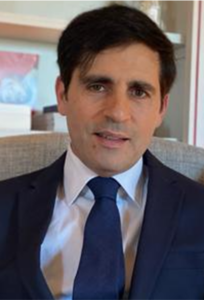“Because most patients with glioblastoma (GBM) will recur, mainly within the first radiation therapy (RT) volume, consequently the question of re-RT, post or instead of reoperation, is critical in our daily practice. As there is no standard in this situation of first recurrence, it seems relevant to share and exchange with the neuro-oncologic community about our 10-year experience of GBM re-irradiation, with and without concomitant Bevacizumab, particularly with the CyberKnife system, which holds in our opinion a very unique place.”

Frédéric Dhermain, M.D., Ph.D., Gustave Roussy University Hospital, Villejuif, France
Dr. Frédéric Dhermain is a Senior Radiation Oncologist at Gustave Roussy University Hospital, one of the largest European Comprehensive Cancer Centers in Oncology. He has more than 15 years of experience in radiation oncology, neuro-oncology and neuro-imaging.
Since 2006, he is head of the multidisciplinary Brain and Spine Tumor Board at Gustave Roussy, implicated in many EORTC BTG trials for inclusion of patients, co-writing radiation chapters.
He is a member of the Association of Neuro-Oncologues d’Expression Française (ANOCEF), the European Association of Neuro-Oncology (EANO), the American Society of Neuro-Oncology (SNO) and ex-officer in the Brain Tumor Group (BTG) of European Organization of Research and Treatment against Cancer (EORTC).
He has published more than 120 articles in high-impact factor scientific journals and also in 4 books of Neuro-oncology. He is reviewer for 5 scientific journals and Associate Editor of Frontiers in Oncology, section Neuro-Oncology.
Dr. Dhermain is mainly a Clinician, with a high interest in Innovation, Translational Research, including Imaging, Combination of Radiotherapy with Immunotherapies/Targeted drugs, all new molecules and devices. Taking care of patients to very unique people is his first motivation, using all oncologic expertise and technologies (radiosurgery, advanced imaging and radiomics) as tools for highly personalized attention. He teaches in several diplomas at Paris-Saclay Medical School of Oncology, also invited regularly in International Webinars (SFRO, EANO School).

Sarah Dumont, M.D., Ph.D., Gustave Roussy University Hospital, Villejuif, France
Dr. Sarah Dumont was born and trained in France as a medical student then medical oncologist. She has spent 4 years in the United States at MD Anderson Cancer Center, ranked number one in Cancer Care internationally where she completed a Ph.D. on molecular oncology. Now in the first European Cancer center, she uses her expertise on brain tumors and sarcoma. She is the head of a 25 bed inpatient unit treating patients with brain, breast, pulmonary, cutaneous cancers or sarcomas. She is part of the institution medical commission and the Ethical Committee.
Moreover, she is involved daily in research, being the principal investigator of clinical trials in Neuro-oncology and subinvestigator of sarcoma and neuro-oncology studies. She is a member of scientific societies such as the EORTC Brain tumor Group and has had multiple communications in international meetings SCO, ESMO, SNO. She has published multiple articles in peer reviewed journals as principal author and coauthor in the field of neuro-oncology, sarcoma and ethiques.
Being a neuro-oncologist leads to choose among few treatments of modest efficacy. Therefore, our goal is to precisely orchestrate systemic treatments, choosing the right sequence and the optimal association with surgery and radiation therapy. After the Stupp regiment, reirradiation plus bevacizumab is an emblematic synergism in glioblastoma.

Moderated by: Giuseppe Minniti, M.D., Ph.D., University of Pittsburgh, School of Medicine, UPMC Hillman Cancer Center, San Pietro Hospital, Rome, Italy
Dr. Minniti is a Professor of Radiation Oncology and Chair of the Academic Unit of Radiation Oncology at the University of Siena and a Clinical Professor of Radiation Oncology at the University of Pittsburgh. His specialist research interest is in treating adults with primary brain tumors. He completed his medical school training, radiation oncology residency training, and Ph.D. course at University of Rome Sapienza and his fellowship/postdoctoral training in radiation oncology and neuro-oncology at Royal Marsden Hospital NHS Foundation Trust London. His major research interests include optimization of radiotherapy and stereotactic radiosurgery for patients with primary and metastatic brain tumors, and combined radiochemotherapy. Professor Minniti serves as a member of Guidelines committee of the European Association for Neuro-Oncology (EANO) and EORTC Brain Tumor Group and is currently coordinator of CNS tumors of the European Society for Medical Oncology (ESMO) Faculty Group.

